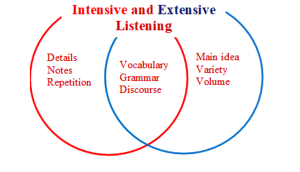 This two-part blog focuses on tips for improving your students’ listening skills with both intensive and extensive listening methods. If you haven’t yet, go read Part I: Intensive Listening, then come back to read Part II. In this second part I will focus on extensive listening by offering tips for extensive listening practice, some resources for teachers to utilize, and some overall listening goals for teachers to bear in mind.
This two-part blog focuses on tips for improving your students’ listening skills with both intensive and extensive listening methods. If you haven’t yet, go read Part I: Intensive Listening, then come back to read Part II. In this second part I will focus on extensive listening by offering tips for extensive listening practice, some resources for teachers to utilize, and some overall listening goals for teachers to bear in mind.
Extensive Listening
Just like extensive reading, this activity involves listening to ‘self-selected’ listening material slightly below the student’s proficiency level and in large quantities. The focus is on overall understanding because the task is more relaxed and self-directed, with learners listening to longer audio or video selections without necessarily trying to understand every word. The goal of extensive listening is to develop overall listening comprehension skills, get used to the sounds and rhythm of speech, and become more familiar with the language in a natural way.
Teacher Tips and Resources for Extensive Listening Practice
Duolingo is one of my favourite language learning apps, as it combines audios with language lessons and podcasts. I use it daily to improve my Spanish. You might want to suggest its use to your students. But there are so many free resources that could be worth reviewing and then suggesting to students, e.g.:
BBC Learning English for intermediate and advance levels
ESL fast.com for a lot of beginner-level dialogue and monologue listening texts
News in Levels.com for news story at three levels
Voice tube.com for online video watching (lower to a higher level)
Ello.org for listening texts (lower to a higher level)
TED Talks for listening practice with a variety of interesting topics
Learner Tips for Extensive Listening Practice
- Listen to a variety of materials: Listen to a wide range of materials such as news broadcasts, podcasts, audiobooks, TED Talks, and TV shows (e.g., “Friends”). This will help you to get exposed to different accents, speaking styles, and topics.
- Choose materials that suit your level: There’s no benefit from trying to use the hardest possible materials. It’s much better to listen at a comfortable level of comprehension. If the material is too difficult, you may get discouraged and lose motivation. But keep on your toes; if the material is too easy, you may not challenge yourself enough.
- Set goals for your listening practice: Each week you could, for example, aim to listen to a certain number of podcasts or watch a certain number of TV shows. Staying motivated and tracking your progress will be easier if you have a specific goal.
- Practice regularly: Practice listening regularly, ideally every day, to build your listening skills. The key to improving your listening comprehension is consistent practice, even for a few minutes a day.
- Stay motivated: It’s important to stay motivated and make listening practice a regular part of your language-learning routine. Set achievable goals and track your progress to stay motivated and focused on improving your listening skills.
- Use technology: The internet is full of resources to help you practice listening, such as language learning apps, online videos, and audio courses. Use these resources to supplement your listening practice and make it more engaging and interactive. To get the best benefit from technology, such as YouTube videos:
-
- First, watch for pleasure (get the big picture)
- Then, watch with the subtitles on: this will help with vocabulary of course, but also with spelling and grammar
- Now, without subtitles: this will train your ears to listen to the tone and the pronunciation of the speakers
- Finally, watch with a clear purpose (i.e., to understand new information, to learn real-life skills)
-
Teacher Goals for Extensive Listening Practice
To make the most of your students’ overall language-listening skills, build vocabulary by introducing colloquialisms and idiomatic expressions, improve pronunciation through exposure to different accents and speaking styles, improve listening comprehension by familiarizing them with the different sounds and structures, develop cultural understanding by providing exposure to other aspects of the culture, and finally enhance overall communication skills by giving students opportunities to engage and express themselves in the language.

Great article. I find the Duolingo podcast to be very effective. I like the way they explain the dialect of the speakers you are about to hear and what to notice about the nuances of their accent.
I have tried other podcasts and audio essays and their effectiveness (for me) varies greatly.